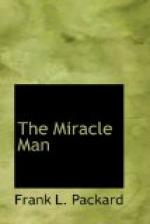“Yes, dear,” Thornton answered gravely. “But what? We cannot do things in a moment. If money—”
Madison shook his head.
“It’s beyond money,” he said. “Money is only a secondary consideration. It’s the needs of the place that are paramount. It’s not so much the bringing of people here—they will hear of what has taken place and will come of their own accord, they will flock here in numbers as time goes on. But then—what? What can be done with them in this little village? For a time perhaps they could be accommodated—but after that they must be turned away.”
“Turned away!” exclaimed Mrs. Thornton, in a hurt cry. “Turned away from hope—to bitterness and misery again! No, no, they must not I Why”—she grasped her husband’s arm agitatedly—“why couldn’t we buy land and put little houses upon it where they could stay?”
Madison leaned suddenly toward her.
“I believe you’ve hit on the idea, Mrs. Thornton,” he said excitedly. “Why not? It would be the finest thing that was ever done in the world. But why not go further—this should not be a private enterprise with the burden on the few.” He turned abruptly to Mr. Thornton. “What a monument from grateful hearts, what a tribute to that saintly soul a huge sanatorium, built and properly endowed, would be! And it is feasible—purely from the voluntary contributions of those who come here and have money—free as the air to the poor who are sick—free to all, for that matter—no one asked to give—but the poorest would gladly lay down their mites.”
“Yes—oh, yes!” cried Mrs. Thornton raptly.
“Yes,” admitted Mr. Thornton thoughtfully; “that might be done.”
“There is no doubt of it,” asserted Madison enthusiastically. “It needs but the initiative on the part of some one, on our part, and the rest will take care of itself. But we must, of course, have the endorsement of the Patriarch—why not go to the cottage now, at once, and talk it over?”
“Can we see him?” asked Mrs. Thornton wistfully. “Oh, I would like to kneel at his feet and pour out my gratitude. But see how all these people go no nearer than that row of trees, as though love or fear or reverence kept them from going further, as though it were almost forbidden, holy ground, as though they were held back by an invisible barrier in spite of themselves.”
“True,” said Madison; “and I sense that very thing myself—all men must sense it after what has taken place, all must feel the presence of a power too majestic, too full of awe for the mind to grasp. This faith”—he threw out his hands in an impotent gesture—“we can only accept it unquestioningly, as a mighty thing, an actual, living, existent thing, even if we cannot fully understand. But I feel that with what we have in mind we have a right to go there now—and we should take that little lad who was cured as well—and his parents, they should come too.”




